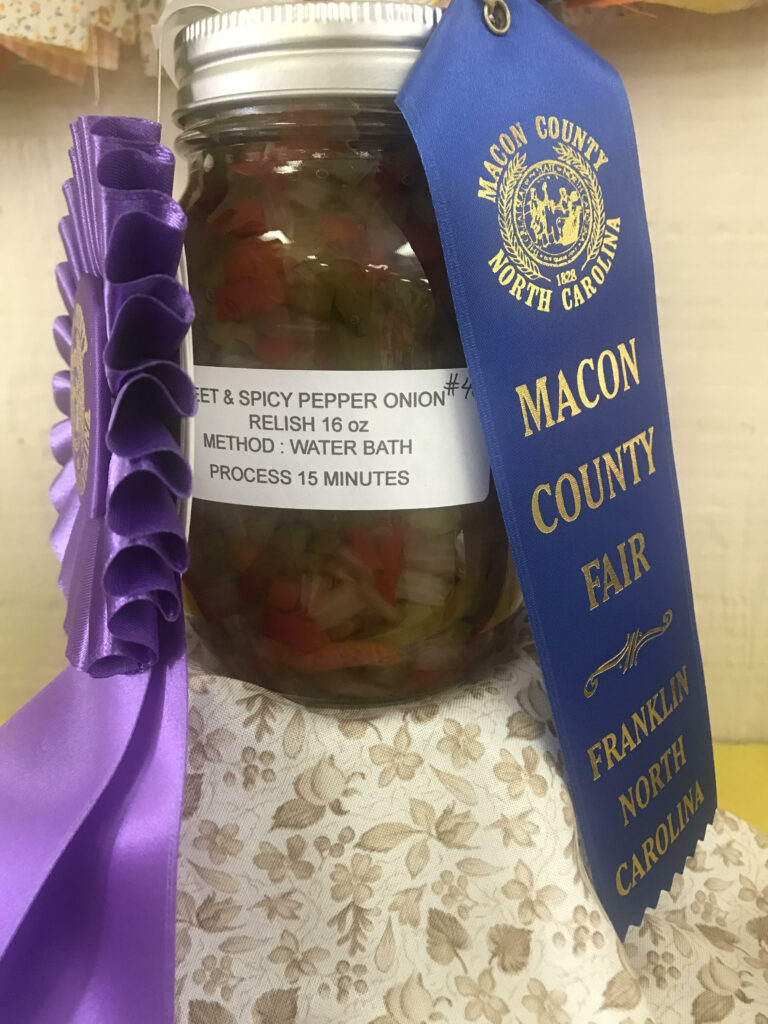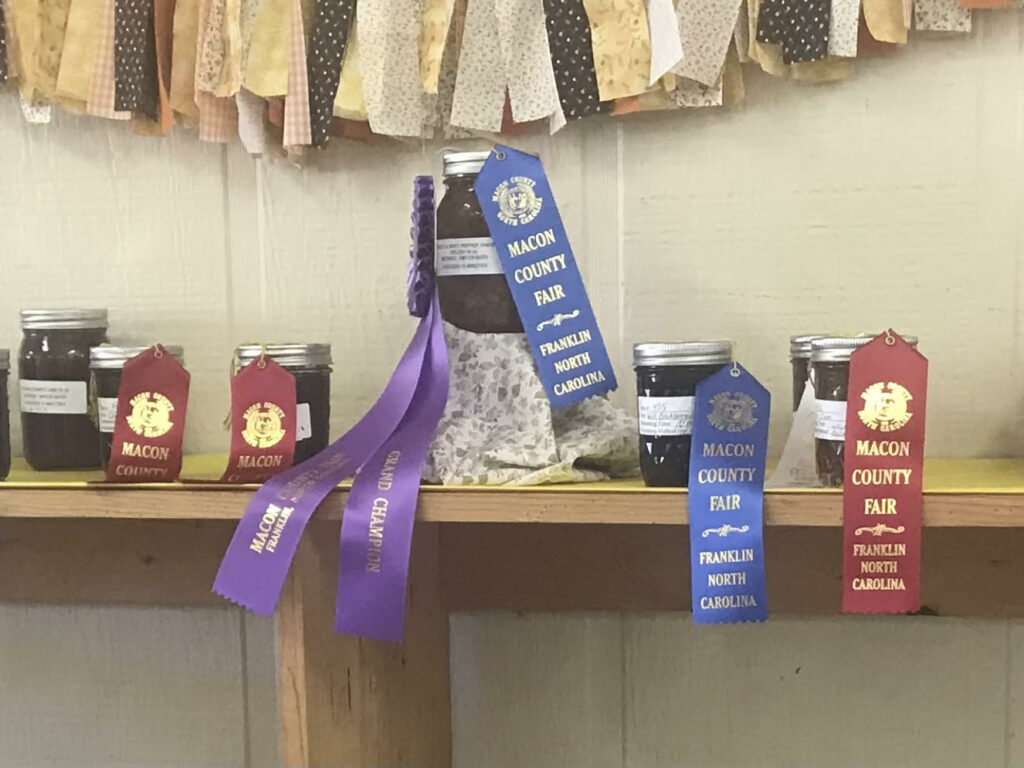Prized Preserves at the Macon County Fair
go.ncsu.edu/readext?956516
en Español / em Português
El inglés es el idioma de control de esta página. En la medida en que haya algún conflicto entre la traducción al inglés y la traducción, el inglés prevalece.
Al hacer clic en el enlace de traducción se activa un servicio de traducción gratuito para convertir la página al español. Al igual que con cualquier traducción por Internet, la conversión no es sensible al contexto y puede que no traduzca el texto en su significado original. NC State Extension no garantiza la exactitud del texto traducido. Por favor, tenga en cuenta que algunas aplicaciones y/o servicios pueden no funcionar como se espera cuando se traducen.
Português
Inglês é o idioma de controle desta página. Na medida que haja algum conflito entre o texto original em Inglês e a tradução, o Inglês prevalece.
Ao clicar no link de tradução, um serviço gratuito de tradução será ativado para converter a página para o Português. Como em qualquer tradução pela internet, a conversão não é sensivel ao contexto e pode não ocorrer a tradução para o significado orginal. O serviço de Extensão da Carolina do Norte (NC State Extension) não garante a exatidão do texto traduzido. Por favor, observe que algumas funções ou serviços podem não funcionar como esperado após a tradução.
English
English is the controlling language of this page. To the extent there is any conflict between the English text and the translation, English controls.
Clicking on the translation link activates a free translation service to convert the page to Spanish. As with any Internet translation, the conversion is not context-sensitive and may not translate the text to its original meaning. NC State Extension does not guarantee the accuracy of the translated text. Please note that some applications and/or services may not function as expected when translated.
Collapse ▲ The 2023 Macon County Fair will be here before we know it. This year’s theme is “We’ve got a good thing growing!”. Do you have a good thing “growing”? If you do, chances are you will have enough food to feed your family, some to share with a neighbor and some to preserve for later. If you enjoy preserving your harvest by pressure canning, water bath canning or even dehydrating, consider displaying your hard work at the Macon County Fair for a chance to win a ribbon and possible bragging rights to the grand champion ribbon. Last year’s fair saw a record number of preserved food entries in all categories. It was a wonderful turn out and everyone enjoyed the display of everything from pickles and relish to soups, sauces, jams and jellies. The North Carolina Cooperative Extension’s Macon office helps with the coordination and judging of all food categories including baked goods, preserved foods, and honey, as well as the cake and pie contests. Judges for the preserved foods category are Family and Consumer Science Agents from surrounding counties that have experience and training in food preservation. Food preservation is a science and there are specific steps that must be followed in order to produce safe food. Microorganisms that can cause food spoilage include molds, yeasts and bacteria. There are specific methods of food preservation to prevent or limit the chances of food being spoiled by these microorganisms and it is important tested recipes are followed in order to ensure the best quality and safest food. Therefore, food safety is the number one consideration when the judges are evaluating a product.
The 2023 Macon County Fair will be here before we know it. This year’s theme is “We’ve got a good thing growing!”. Do you have a good thing “growing”? If you do, chances are you will have enough food to feed your family, some to share with a neighbor and some to preserve for later. If you enjoy preserving your harvest by pressure canning, water bath canning or even dehydrating, consider displaying your hard work at the Macon County Fair for a chance to win a ribbon and possible bragging rights to the grand champion ribbon. Last year’s fair saw a record number of preserved food entries in all categories. It was a wonderful turn out and everyone enjoyed the display of everything from pickles and relish to soups, sauces, jams and jellies. The North Carolina Cooperative Extension’s Macon office helps with the coordination and judging of all food categories including baked goods, preserved foods, and honey, as well as the cake and pie contests. Judges for the preserved foods category are Family and Consumer Science Agents from surrounding counties that have experience and training in food preservation. Food preservation is a science and there are specific steps that must be followed in order to produce safe food. Microorganisms that can cause food spoilage include molds, yeasts and bacteria. There are specific methods of food preservation to prevent or limit the chances of food being spoiled by these microorganisms and it is important tested recipes are followed in order to ensure the best quality and safest food. Therefore, food safety is the number one consideration when the judges are evaluating a product.
If you have entered a preserved food in the past and didn’t get a ribbon, chances are the judges couldn’t find a tested recipe. Grandma’s recipe, even though it’s been around for years and everyone loves it, may or may not be able to be judged. If the judges can’t find a recipe in their resources from USDA, the Ball Blue Book or the So Easy to Preserve book produced by The University of Georgia Extension, the item can only be displayed and not evaluated or judged for a ribbon.
The following are guidelines from the N.C. Cooperative Extension’s Family and Consumer Science Department in ensuring you are preserving a safe, quality product as well as pointers to help your chances of securing a ribbon at the fair!
- Use a tested recipe. Sources include the Ball Blue Book, So Easy to Preserve by the University of Georgia’s Cooperative Extension Service and the National Center for Home Food Preservation (USDA)
- When bringing your home canned item to the fair for entry, be sure you know the processing method, time and pounds of pressure. This information is recorded for each entry and needed for the judges to evaluate the product.
- Don’t forget to adjust for altitude. We live in the mountains and processing times are different for areas above sea level. The resources mentioned above will have altitude adjustment charts. This is very important for food safety reasons.
- Use the correct type of jar. Mason-type jars specifically designed for home canning are best. Commercial mayonnaise jars may not seal and may break, especially in a pressure canner. Additionally, be sure to follow the correct processing time for the jar size.
- Use two-piece lids. Be sure there is no rust on the bands. Most of the canning jars sold today have two-piece, self-sealing lids. This type consists of a flat metal disc which has a sealing compound around the outer edge and a separate metal screw band. The lid is used only once; the screw band may be used over and over, unless it rusts. Some companies are selling one piece and reusable lids. Extension does not recommend using these types of lids as they have not been used in current tested recipes.
- Fruits and vegetables that require cutting into smaller pieces should be as uniform in size as possible.
- Pack fruits and vegetables according to the recipe ensuring they’re not too crowded but there is enough to ensure the jar is filled properly.
- Process according to the recipe to prevent fluid loss. Some fluid loss can be expected with certain types of vegetables, especially starchy vegetables. However, if there is too much fluid loss, the jar will not score as high. There are ways to minimize fluid loss such as allowing the canner to vent and depressurize properly, keeping pressure steady during processing, ensuring all air bubbles are worked out of jar before processing, ensuring jar rim is clean so a proper seal can be formed, hot pack appropriate foods, leave appropriate head space and ensure jars are covered with 1 to 2 inches of water in water bath canner throughout the processing period.
- Prevent fruits from darkening by using ascorbic acid prior to processing.
- Follow tested recipes to ensure jams, jellies, preserves, marmalades, conserves, and fruit butters are the right consistency.
- Get started preserving your favorite foods. Canning season is here.
If you would like to learn more about the food preservation class or entering your preserved goods in the fair, contact Kim Terrell, Family and Consumer Science Agent at 828-349-2047 or kimberly_terrell@ncsu.edu.





